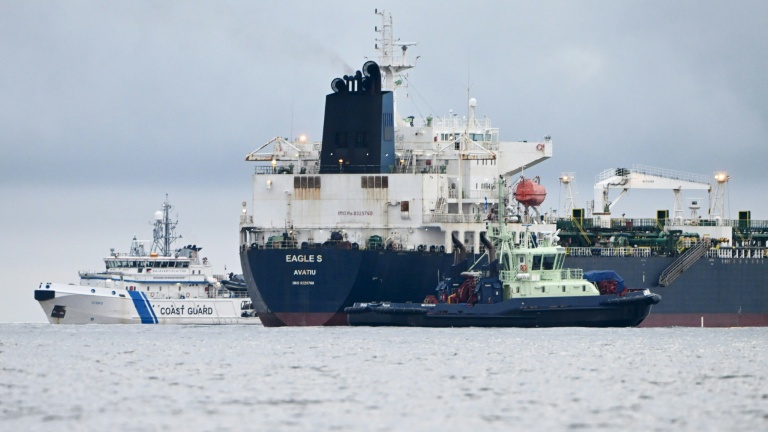Top Stories
Helsinki Court Dismisses Case Over Baltic Cable Damage

A court in Helsinki has dismissed a case against three crew members of a Russian-registered oil tanker accused of damaging undersea cables in the Gulf of Finland. The Helsinki District Court ruled on Friday that the case was beyond its jurisdiction, affecting the legal proceedings surrounding the incident that occurred on December 25, 2024.
The crew of the Cook Islands-registered tanker Eagle S faced allegations of dragging the ship’s anchor along the seabed for approximately 90 kilometres (56 miles), leading to damage of five undersea cables, including the EstLink 2 power cable and four telecommunications cables connecting Finland and Estonia. This incident is among several similar occurrences that have raised concerns about maritime security in the region since the onset of Russia’s full-scale invasion of Ukraine in February 2022.
According to the court, the charges were dismissed as it was not possible to apply Finnish criminal law to the case. Prosecutors had argued that Davit Vadatchkoria, the captain from Georgia, along with senior officers Robert Egizaryan and Santosh Kumar Chaurasia, both of whom are also from Georgia and India respectively, had intentionally neglected their duties. They were charged with “aggravated criminal mischief and aggravated interference with communications,” with prosecutors seeking prison sentences of at least two-and-a-half years.
The prosecution contended that the crew failed to investigate a notable drop in the ship’s speed and engine revolutions, which they claimed was caused by an external force affecting the vessel. The defendants, however, denied the allegations, asserting that the cables were severed accidentally. They testified that the ship experienced engine problems and challenging weather conditions, which contributed to the incident.
The court’s ruling indicated that the damage did not meet the threshold of consequences necessary to classify the actions as criminal mischief under Finnish law. It stated that the incident, while resulting in significant economic losses, did not have the detrimental impact on Finland’s energy supply or telecommunications infrastructure that would warrant legal action.
The court determined that the anchor loss was due to a failure of the securing mechanism and categorized the event as an incident of navigation under the United Nations Convention on the Law of the Sea. The court emphasized that jurisdiction lies with the ship’s flag state or the native states of the defendants where criminal law applies.
At the conclusion of the trial in September, the court lifted the travel bans that had been imposed on the suspects since December 2024. Prosecutor Mikko Larkia had previously expressed skepticism regarding the crew’s awareness of the anchor dragging behind the vessel, stating, “If a ship drags an anchor behind it for several hours for 90 kilometres, is it really possible that no one would notice?”
Despite discussions surrounding maritime security and hybrid warfare, potential Russian responsibility for the incident was not addressed during the trial. As geopolitical tensions continue to rise in the Baltic region, the dismissal of this case highlights the complexities of jurisdiction and accountability in international maritime law.
-

 Science2 months ago
Science2 months agoToyoake City Proposes Daily Two-Hour Smartphone Use Limit
-

 Health2 months ago
Health2 months agoB.C. Review Reveals Urgent Need for Rare-Disease Drug Reforms
-

 Top Stories2 months ago
Top Stories2 months agoPedestrian Fatally Injured in Esquimalt Collision on August 14
-

 Technology2 months ago
Technology2 months agoDark Adventure Game “Bye Sweet Carole” Set for October Release
-

 World2 months ago
World2 months agoJimmy Lai’s Defense Challenges Charges Under National Security Law
-

 Technology2 months ago
Technology2 months agoKonami Revives Iconic Metal Gear Solid Delta Ahead of Release
-

 Technology2 months ago
Technology2 months agoSnapmaker U1 Color 3D Printer Redefines Speed and Sustainability
-

 Technology2 months ago
Technology2 months agoAION Folding Knife: Redefining EDC Design with Premium Materials
-

 Technology2 months ago
Technology2 months agoSolve Today’s Wordle Challenge: Hints and Answer for August 19
-

 Business2 months ago
Business2 months agoGordon Murray Automotive Unveils S1 LM and Le Mans GTR at Monterey
-

 Lifestyle2 months ago
Lifestyle2 months agoVictoria’s Pop-Up Shop Shines Light on B.C.’s Wolf Cull
-

 Technology2 months ago
Technology2 months agoApple Expands Self-Service Repair Program to Canada









